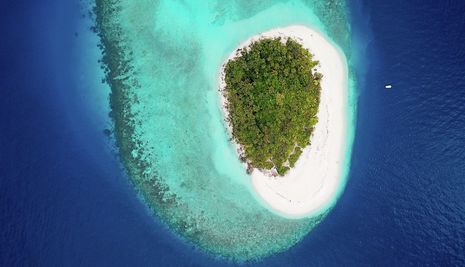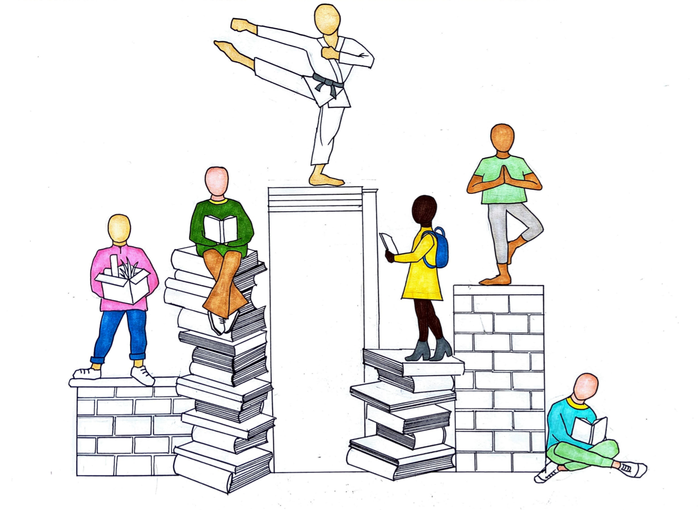Napoleon’s Desert Island
Nick Bartlett reflects on relationships after a dinner table conversation with his family.

Mum likes to wonder into my room a few times a day. “Just checking in, darling,” she likes to say,” How are you feeling?” “As good as I was forty-five minutes ago, thanks Mum. How are you tracking?” I usually respond. She’s very caring, my Mum. She loves to stay connected to people — friends, family, mentors, mentees — whoever it may be. In the afternoon, I’ll saunter downstairs, distracted from study by a pang of hunger. With my head sticking in the bottom draw of the fridge, hunting a cold orange, I’ll hear Dad laughing to himself in the living room. I think he finds books funnier than people. Oil and water, they are, my parents.
My Mum likes people, my Dad prefers dogs. Mum listens to Gloria Steinem and Brene Brown, Dad reads Mary Beard and Aeschylus. Dad is careful and considered, Mum is busy and daring. People often say that opposites attract. I’m not so sure.
“People often say that opposites attract. I’m not so sure.”
Until lockdown, I had never properly considered the practical implications of the difference in my parent’s respective characters. After my departure date from Melbourne had been confirmed last week, we sat down for a family dinner, joking and teasing as to how my absence would change the family dynamic. With a little brother in his final year of school, and preoccupied with the equivalent of his A-level examinations, Mum and Dad were going to effectively be living alone with one another.
“Do you think you would last if you were left on a desert island together?” I asked them, after Dad had passed me the beans.
“Like Napoleon?” Dad clarified. “Yeah, I guess, but for eternity.” Dad didn’t hesitate. “We wouldn’t make it.” I looked at Mum, and she nodded her assent, completely unperturbed by Dad’s response. I waited, hoping that Mum would take up the baton. “I think I’d go crazy,” Mum said with a degree of affection, “Dad doesn’t talk that much.” I looked back at Dad; he smiled in agreement. I shook my head in disbelief. A wry smile appeared across my face. What a bizarre way of showing your love for someone. Adoration in honesty. “Fair enough,” I concluded, and walked my dishes towards the sink. “Which island was Napoleon exiled to again?” Dad called after me. “Elba.” “What about the other one?” He pressed, as I walked upstairs. “No fucking idea!”
It was slightly unnerving to hear their response. Of course, that sort of isolation would incur its own challenges and aggravations and irritations. I imagine that most relationships would be strained or broken under that kind of existence. But, for the most part, I had always envisaged living with someone whose company was so appealing that I sought long periods of time with them. Someone whose company on a desert island would fill me with confidence and make me less likely to balk at the prospect of such perennial solitude.
How could my parents acknowledge their relationship’s inevitable demise under the constraints of a desert island existence, and still accomplish twenty-seven years of a happy and fulfilling marriage? I understood that their response to the dessert island hypothetical hinged on a disconnect in their interests and personalities. But I could not quite comprehend how such a successful marriage would be so swiftly brought to an end by a solitary existence, at least in their eyes. How then could this disconnect prevent them from careering around on a desert island, while never interfering in the longevity of their relationship in the real world?
Perhaps, love is not solely limited to common interests as I had imagined. Two men who never run out of conversation on a desert island may have no more strong a relationship than my Mum and Dad, the couple who has openly admitted to running out of things to say to one another as the years have crept by, but who love each other and the family they have created more than anything.
Dad once said to me that if your partner does not share your values, the relationship probably won’t last. At first, I found this puzzling. How do shared values distinguish themselves from personal interests?
Upon reflection, I decided that, in my mind, values are a sort of personal philosophy; they provide the framework according to which we make decisions and actions. Whilst our values might inform our personal interests and hobbies, they are also more foundational, and fundamental, in that they are the sort of invisible stitches that bind together the essence of who we are. In this way, I see our values as a kind of secular religion, a conscious set of beliefs which guide our way through life. Ironically, whilst most of us are able to list our interests without so much as a hesitation, very few of us could catalogue the five core values according to which we live our lives.
“Whilst our values might inform our personal interests and hobbies, they are also more foundational, and fundamental, in that they are the sort of invisible stitches that bind together the essence of who we are.”
For my parents, it does not matter that they do not share layer upon layer of personal interest, passions that would sustain a desert island existence; what matters is the alignment of their values: empathy, love, openness, fairness, selflessness, gratitude and work ethic. For as long as they have a similar belief in the way in which they interact in this world — with ideas and causes as well as the world’s inhabitants — it does not matter that Mum would rather sit on a cactus than hear about Dad’s latest research on the Parthenon.
So, to return to the question of the attraction of opposites, I think there should be a qualifier. Opposites attract, if there is an underlying set of shared values. At least, in the case of my parents, I think it is their shared values that provide the foundation for their love. Perhaps, when I asked Mum and Dad the desert hypothetical, I was too fixated on the idealised partner who shares in your interests. Regardless, Mum and Dad’s infinite love for one another served as a poignant reminder of what else is important in relationships, whatever form that relationship may take.
Previously, I had not spent much time thinking about something so esoteric as personal values, but perhaps it’s time I began.
 News / Cambridge academics stand out in King’s 2026 Honours List2 January 2026
News / Cambridge academics stand out in King’s 2026 Honours List2 January 2026 Interviews / You don’t need to peak at Cambridge, says Robin Harding31 December 2025
Interviews / You don’t need to peak at Cambridge, says Robin Harding31 December 2025 News / AstraZeneca sues for £32 million over faulty construction at Cambridge Campus31 December 2025
News / AstraZeneca sues for £32 million over faulty construction at Cambridge Campus31 December 2025 Comment / Plastic pubs: the problem with Cambridge alehouses 5 January 2026
Comment / Plastic pubs: the problem with Cambridge alehouses 5 January 2026 News / Cambridge businesses concerned infrastructure delays will hurt growth5 January 2026
News / Cambridge businesses concerned infrastructure delays will hurt growth5 January 2026








